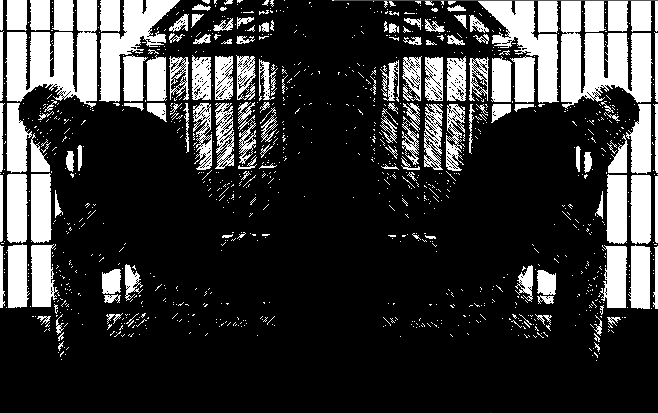TWH – During the COVID-19 pandemic, The Wild Hunt has been reporting the stories of Pagans helping their communities. We reported on Pagan food pantries and the work of Hands of the Goddess, and we have also covered the efforts and challenges of Pagans in healthcare. New research suggests that “doing good” not only has a positive effect on our sense of wellbeing but also has a positive effect on our physical health.
Kindness, compassion, and cooperation seem to be “strained” aspects of human behavior. Many individuals are taught that these behaviors result from the suppression of our baser selves. They represent a triumph over our instinctual impulses.
Those selfish impulses were famously highlighted in 1950 by mathematicians Merrill Flood and Melvin Dresher in their prisoner’s dilemma problem, which was later formalized by Albert W. Tucker.
The problem is traditionally presented as follows: two individuals commit a crime and are arrested. They are interrogated in separate areas and have no way of communicating with one another. Prosecutors have enough information to convict each on a lesser charge with a minor sentence, but lack sufficient evidence to convict the pair on a more serious charge that carries a much more significant sentence.
Each prisoner is simultaneously presented with the opportunity to betray the other by testifying that the other committed the crime. Each prisoner has a choice to cooperate with law enforcement or remain silent. If one testifies against the other, that prisoner will receive the minor sentence unless new evidence emerges.
The outcomes are as follows:
- Each prisoner betrays the other and both serve a longer sentence for the more serious conviction because each provides evidence against the other.
- One prisoner betrays the other, and the betrayed prisoner serves a combined sentence for the lesser and greater charge. The betrayer is rewarded with not having to serve any time.
- Both prisoners remain silent and serve the lesser conviction.
A purely self-interested prisoner seems to be incentivized to betray their partner, since it could get them out of their punishment altogether – but if both prisoners act this way, they both end up serving the longer sentence. The best option for the prisoners is silence: it has the best payout. But that silence requires the trust and cooperation of the peer without having immediate confirmation that they will do the same.

The prisoner’s dilemma [M. Tejeda-Moreno]
Rational self-interest should drive the prisoners to seek the best deal for themselves. Despite that, self-interest research on the problem has consistently shown that we display a systemic bias toward cooperation. Even in the earliest research on the dilemma the accused trusted each other, even though they could not communicate with their partner.
The findings go against the common belief that we act only in our personal self-interest; we usually act on behalf of the common good of our community.
Social scientists refer to this phenomenon as “prosocial behavior,” or “prosociality.” We may even be evolutionarily wired in support of it. Our ability to work for the collective good and produce societal-level benefits may be as much an important outcome of evolution as philosophy or mathematics.
Prosociality is commonplace, and its ingredients of compassion, kindness, and trust are necessary for a well-functioning community. We observe prosociality in a range of behaviors from volunteerism to charitable donations, as well as acts motivated out of concern for the benefit of others in the community – which includes gifting behavior for the sake of helping others.

Gifting presents significant benefits to the giver [M. Tejeda-Moreno]
New research, however, now suggests that there may be some “selfish” personal benefits to prosocial behavior. Could acting prosocially benefit the giver as well as the recipient?
The effect is called the “Helper’s High,” and scientists have seen hints of it not only in past research but in knowledge from ancient pagans. Aristotle called it “eudaimonia” – that correct actions lead to the greater well-being of the individual. It was the counterpole to hedonia, actions that seek pleasure and avoid pain.
One previous study from 2016 used magnetic resonance imaging (MRI) to look at the benefits of giving and receiving support at the neurobiological level. Researchers asked participants to conduct various tasks of giving and receiving and measured stress-related activity in the brain. While giving and receiving both produce protective effects against negative psychological outcomes, the prosocial tasks lit up parts of the brain that reduced stress-related activity.
Even earlier research had found some interesting connections. In a study of middle-aged adults, researchers found not only increased self-reported happiness but also better self-reported health outcomes for prosocial participants. Subsequent research also found evidence that volunteering reduced mortality risk among late-middle-aged and older adults.
The newest research, published this month in the American Psychological Association’s Psychological Bulletin, combined previous studies and found significant effects from eudemonia. The research involves the use of meta-analysis, a statistical tool for combining the results of other studies to determine the overall effects of a specific phenomenon or intervention. In this case, the aim of the research was to determine if prosociality influenced wellbeing, psychological functioning, and physical health.
The research findings supported the hypothesized connections. Prosociality appeared strongly supportive of psychological functioning and showed more modest, but observable and significant relationship with physical health. Furthermore, prosociality showed benefits on well-being over other observations of volunteering, frequency, or job status. In other words, those who gave benefited psychologically and physically from the act of giving.
Interestingly, younger givers appeared to exhibit higher levels of mental and emotional well-being than physical health, while older givers, whether retired or still in the workforce, reported better physical health only.
Women also seemed to benefit more from giving. The research showed stronger relationships of prosociality on wellbeing or physical health compared to men.
The researchers closed by noting that more work must be done on prosociality to find definitive measures of its benefits. Of particular interest are the neurological and psychological mechanisms that underpin these benefits. A better understanding of these mechanisms will provide clues not only to our evolutionary path of prosocial behavior, but also how we may leverage our understanding of giving to benefit society more on both a personal and communal level.
The connection between eudemonia and the benefits to the giver has been “hiding” in Aristotle’s works for almost 2,000 years. Furthermore, the virtue of reciprocity is deeply connected with many Pagan traditions. Psychological science now seems to affirm the benefits of gifting and encourages us to reap its benefits.
The Wild Hunt is not responsible for links to external content.
To join a conversation on this post:
Visit our The Wild Hunt subreddit! Point your favorite browser to https://www.reddit.com/r/The_Wild_Hunt_News/, then click “JOIN”. Make sure to click the bell, too, to be notified of new articles posted to our subreddit.